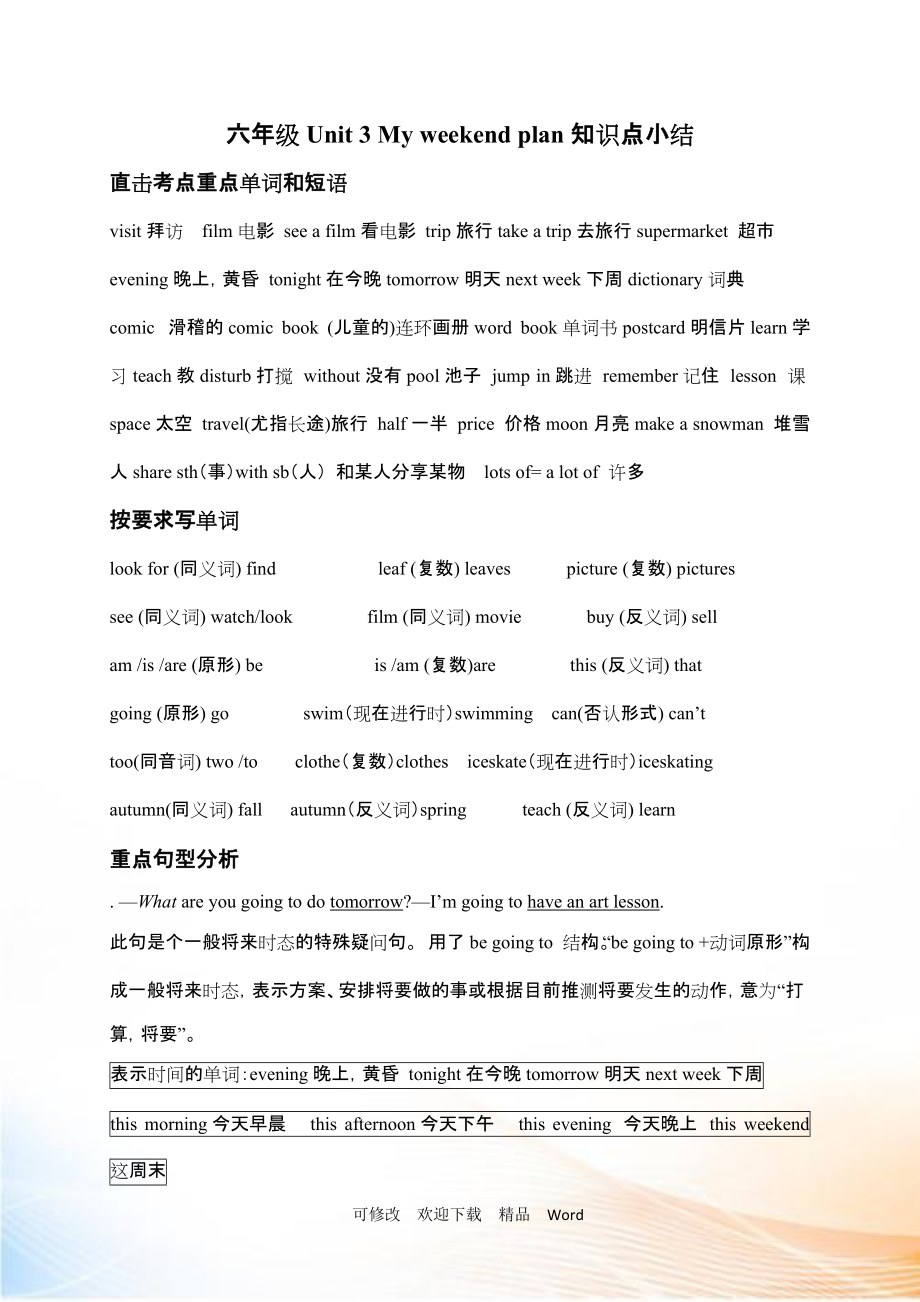《六年級(jí)Unit 3 My weekend plan知識(shí)點(diǎn)小結(jié)》由會(huì)員分享�����,可在線閱讀�,更多相關(guān)《六年級(jí)Unit 3 My weekend plan知識(shí)點(diǎn)小結(jié)(3頁珍藏版)》請(qǐng)?jiān)谘b配圖網(wǎng)上搜索。
1��、
六年級(jí)Unit 3 My weekend plan知識(shí)點(diǎn)小結(jié)
直擊考點(diǎn)重點(diǎn)單詞和短語
visit拜訪 film電影 see a film看電影 trip旅行take a trip去旅行supermarket 超市
evening晚上��,黃昏 tonight在今晚tomorrow明天next week下周dictionary詞典
comic 滑稽的comic book (兒童的)連環(huán)畫冊(cè)word book單詞書postcard明信片learn學(xué)習(xí)teach教disturb打攪 without沒有pool池子 jump in跳進(jìn) remember記住 lesson 課space太空 t
2�����、ravel(尤指長(zhǎng)途)旅行 half一半 price 價(jià)格moon月亮make a snowman 堆雪人share sth(事)with sb(人) 和某人分享某物 lots of= a lot of 許多
按要求寫單詞
look for (同義詞) find leaf (復(fù)數(shù)) leaves picture (復(fù)數(shù)) pictures
see (同義詞) watch/look film (同義詞) movie buy (反義詞) sell
am /is /are (原形) be is /am
3���、 (復(fù)數(shù))are this (反義詞) that
going (原形) go swim(現(xiàn)在進(jìn)行時(shí))swimming can(否認(rèn)形式) can’t
too(同音詞) two /to clothe(復(fù)數(shù))clothes iceskate(現(xiàn)在進(jìn)行時(shí))iceskating
autumn(同義詞) fall autumn(反義詞)spring teach (反義詞) learn
重點(diǎn)句型分析
. —What are you going to do tomorrow?—I’m going to have an art lesson.
4��、此句是個(gè)一般將來時(shí)態(tài)的特殊疑問句���。 用了be going to 結(jié)構(gòu)���。“be going to +動(dòng)詞原形”構(gòu)成一般將來時(shí)態(tài)����,表示方案���、安排將要做的事或根據(jù)目前推測(cè)將要發(fā)生的動(dòng)作���,意為“打算,將要”��。
表示時(shí)間的單詞:evening晚上���,黃昏 tonight在今晚tomorrow明天next week下周
this morning今天早晨 this afternoon今天下午 this evening 今天晚上 this weekend 這周末
動(dòng)詞短語原形:make a snowman 堆雪人 take a trip去旅游 see a film看電影
visit my gra
5�����、ndparents 拜訪祖父母watch TV看電視learn how to swim學(xué)怎樣游泳
go skating去滑冰row a boat劃船read a poem讀詩go fishing 去釣魚 go skiing去滑雪 go shopping去購物 make mooncakes做月餅
E.g. I’m going to make a snowman.我打算去堆雪人�。
We’re going fishing.我們打算去釣魚。
2.We are going to draw some pictures in Renmin Park.
此句是be going to 結(jié)構(gòu)的肯定
6�����、句式��?���;窘Y(jié)構(gòu)為:主語+ be going to +動(dòng)詞原形+表示將來的時(shí)間。some一些�����,用于肯定句中����,后接可數(shù)名詞的復(fù)數(shù)形式或不可數(shù)名詞,而在疑問句或否認(rèn)中表示一些要用any�����。
3.—Where are you going?—We’re going to the cinema.
此句是where 引導(dǎo)的一般將來時(shí)態(tài)的特殊疑問句��,where意為“哪里”����,它是對(duì)地
點(diǎn)提問的特殊疑問詞���,因此答復(fù)時(shí)要答復(fù)一個(gè)具體的地點(diǎn)。
表示地點(diǎn)的詞:school學(xué)校 park 公園 cinema電影院 hospital醫(yī)院 post office郵局
bus stop公共汽車站 home家
7�����、supermarket超市museum博物館 bookstore書店 restaurant餐館bank銀行l(wèi)ake湖library圖書館zoo動(dòng)物園park公園garden花園
hotel旅館
4.—When are you going?—Next Monday.
此句中when意為“什么時(shí)候���,何時(shí)”�����,它引導(dǎo)的疑問句用來對(duì)年、月����、日等時(shí)間進(jìn)行提問。如:—When do you go to school in the morning?—At 8:00.
5.—How can you learn to swim without going to a pool?
此句是由how引導(dǎo)的特殊疑問句��,詢問別人做事的方式����、方法����。句中的can 意為“能夠”�����,是情態(tài)動(dòng)詞���,后面跟動(dòng)詞原形�����?��!發(fā)earn to do something,”學(xué)習(xí)做某件事,一般表示還沒學(xué)或還沒做的事情����,含義將來的意思。
可修改 歡迎下載 精品 Word
 六年級(jí)Unit 3 My weekend plan知識(shí)點(diǎn)小結(jié)
六年級(jí)Unit 3 My weekend plan知識(shí)點(diǎn)小結(jié)

